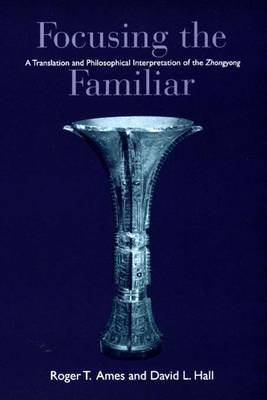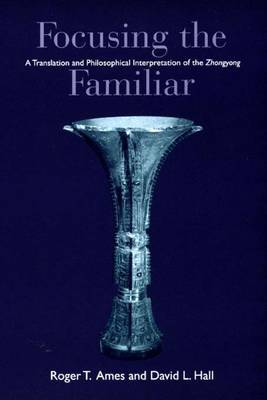
- Afhalen na 1 uur in een winkel met voorraad
- Gratis thuislevering in België vanaf € 30
- Ruim aanbod met 7 miljoen producten
- Afhalen na 1 uur in een winkel met voorraad
- Gratis thuislevering in België vanaf € 30
- Ruim aanbod met 7 miljoen producten
Zoeken
Omschrijving
The Zhongyong--translated here as Focusing the Familiar--has been regarded as a document of enormous wisdom for more than two millennia and is one of Confucianism's most sacred and seminal texts. It achieved truly canonical preeminence when it became one of the Four Books compiled and annotated by the Southern Song dynasty philosopher Zhu Xi (1130-1200). Within the compass of world literature, the influence of these books (Analects of Confucius, Great Learning, Zhongyong, and Mencius) on the Sinitic world of East Asia has been no less than the Bible and the Qu'ran on Western civilization.
With this new translation David Hall and Roger Ames provide a distinctly philosophical interpretation of the Zhongyong, remaining attentive to the semantic and conceptual nuances of the text to account for its central place within classical Chinese literature. They present the text in such a way as to provide Western philosophers and other intellectuals access to a set of interpretations and arguments that offer new insights into issues and concerns common to both Chinese and Western thinkers. In addition to the annotated translation, a glossary of terms gives in concise form important senses of the terms that play a key role in the argument of the Zhongyong. An appendix addresses some of the more technical issues relevant to the understanding of both the history of the text and the history of its English translations. Here the translators introduce readers to the best contemporary textual studies of the Zhongyong and make use of the most recent archaeological discoveries in China to place the work within its own intellectual context.Specificaties
Betrokkenen
- Auteur(s):
- Vertaler(s):
- Uitgeverij:
Inhoud
- Aantal bladzijden:
- 182
- Taal:
- Engels
Eigenschappen
- Productcode (EAN):
- 9780824824600
- Verschijningsdatum:
- 31/08/2001
- Uitvoering:
- Paperback
- Formaat:
- Trade paperback (VS)
- Afmetingen:
- 154 mm x 228 mm
- Gewicht:
- 258 g

Alleen bij Standaard Boekhandel
+ 64 punten op je klantenkaart van Standaard Boekhandel
Beoordelingen
We publiceren alleen reviews die voldoen aan de voorwaarden voor reviews. Bekijk onze voorwaarden voor reviews.











